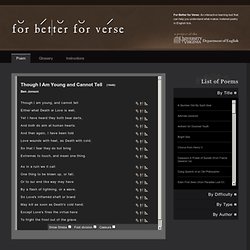

&untitled. & by dearhonestyx [2406002-2] Exceptindreams: 674: A Working List of Things I Will Never Tell You. I carry your heart. Though I Am Young and Cannot Tell. Accent: emphasis given a syllable in ordinary usage, as provided by a pronouncing dictionary.

See also stress. accentual-syllabic: the prosodic mode that dominated English-language poetry 1400-1900, and that this tutorial exclusively addresses. Alike distinct from verse that is quantitative (measuring duration, as in classical Greek and Latin), accentual (counting only beats, as in Old English), and syllabic (counting only syllables, as in certain: 20th-cy. experiments), accentual-syllabic verse is based on recurrent units (feet) that combine slacks and stresses in fixed sequence. acephalous line: a “headless” line in iambic or anapestic meter, which omits (a) slack syllable(s) from the first foot.
Alexandrine: iambic hexameter line, usually with a strong midpoint caesura; most familiar in Romance-language poetry but not rare in English. alliteration: repetition of the same initial sound in nearby words. Anapest: metrical foot consisting of two slacks and a stress: υ υ / anaphora: assonance: iamb: Square Stanza. Location, Location, Location. Great Poems « Greatest Books of All Time » Life-Changing Arts. A selection of great poems from centuries of brillant authors and poets.

Whether you are new to the world of poetry and wish to savor it, or a well-versed poetry connoisseur, either way you will probably enjoy the classics of world poetry. The poems are sorted by vote. To vote for a poem, click on the left of it. You can read and browse the poems by clicking on their title. Voting is possible once per day. Votes PoemAuthor IfRudyard Kipling EchoChristina Georgina Rossetti If you think the best poem of all times is not even on this list, by all means, let us know which poem it is and why you think it should be added. Get inspired.. inspire others.. Back to Greatest Books of All Time. Do not stand at my grave and weep. Do Not Stand at My Grave and Weep is a poem written in 1932 by Mary Elizabeth Frye.

Although the origin of the poem was disputed until later in her life, Mary Frye's authorship was confirmed in 1998 after research by Abigail Van Buren, a newspaper columnist.[1] Full text[edit] Do not stand at my grave and weep, I am not there; I do not sleep. I am a thousand winds that blow, I am the diamond glints on the snow, I am the sunlight on ripened grain, I am the gentle autumn rain. When you awaken in the morning’s hush I am the swift uplifting rush Of quiet birds in circled flight. I am the soft stars that shine at night. Do not stand at my grave and cry, I am not there; I did not die. Origins[edit] Mary Frye, who was living in Baltimore at the time, wrote the poem in 1932. Mary Frye circulated the poem privately, never publishing or copyrighting it. Jabberwocky.